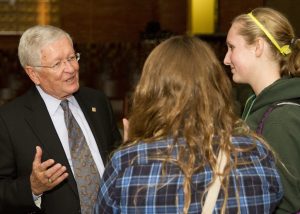“Tomato King” Serves Up Food for Thought at Hoover
The next time you’ve got more tomatoes than you can foist upon friends and family at the end of the growing season, just think of the Tomato King and how he must have felt dumping 30,000 gallons of spoiled pizza sauce in the hills of Pennsylvania.
That sad, messy tale was the low light of World Food Prize Laureate Dr. Philip Nelson’s presentation to an engaged audience of STEM students this morning at Hoover High School. Dr. Nelson, as the 2007 honoree, is in town for this week’s World Food Prize events and he was back in his element this morning standing in front of a group and teaching. After all, he rose to prominence in the global food chain as a professor of food science at Purdue University where he arrived intending to become a veterinarian and still is attached as a Professor Emeritus.
Dr. Nelson earned the title of Tomato King when he was 15, about the average age of his audience at Hoover, and won a 4H contest by producing two dozen tomatoes that were deemed perfect by the judges. His family then was in the canning business but still he wanted to be a vet until someone in the horticulture school at Purdue made him an offer he couldn’t refuse and he embarked on a research career that eventually made him the godfather of aseptic bulk food storage.
Nicolas Appert pioneered food canning in the late 18th century so Napoleon could wage war farther and wider and still have food for his far-flung troops. Appert thought evil spirits spoiled food, Nelson explained. Later, Louis Pasteur figured out that microscopic organisms were to blame for spoilage. And much, much later, along came Philip Nelson who devised the ways and means of storing and shipping commodities like milk and orange juice and tomato sauce millions of gallons at a time.
First he developed a 100 gallon epoxy-lined aseptic (i.e., germ-free) tank. He was proud but private industry wasn’t interested – too small. Maybe that’s when he first learned to think big, a bit of advice that he stressed to the Hoover STEM cohort. Next was a 500 gallon capacity, then 1,000. Now he was getting somewhere. He started getting help from investors in the private sector. The one glaring setback along the way was when contamination somehow infiltrated those twin 15,000 gallon tanks of pizza sauce. Back at the drawing board, Nelson figured the error of his ways and eventually helped develop freighter ships with cargo holds of up to eight million gallons that gave Brazil a fighting chance against Tropicana, a stateside beneficiary of Nelson’s work. In the global orange juice wars Nelson may have been something of an academic double agent, but his revolutionary advancements became the basis for establishment of the International Food Technology Center at Purdue which focuses on the application of advancements in food science to third world countries.
Of course, food insecurity isn’t limited to impoverished nations and besides Dr. Nelson’s detour from the official World Food Prize itinerary, DMPS students regularly find other ways to use the annual festival as a learning opportunity. Last year, seven DMPS high school students joined their peers from 27 states and 5 nations at World Food Prize’s Global Youth Institute, where they engaged with scientists and presented their own research. And just yesterday, students from Cowles Montessori School took part in the 2013 Iowa Hunger Summit, sponsored by The World Food Prize Foundation. The Foundation learned about a gardening project at Cowles, including the fact that the school donates excess produce to the community. Several Cowles students helped out at the Summit’s meal packaging event.
When Dr. Nelson was notified that he’d been selected to receive the 2007 Norman Borlaug Award, named for the Iowan who won the Nobel Peace Prize for his breakthroughs in feeding starving people around the world, he says it changed his life but not him.
“At the awards ceremony at your beautiful state capitol building here they had herald trumpeters,” he told the kids at Hoover. “When I got back home and came down for my morning coffee I asked my wife where the trumpets were,” he added with a laugh. Then he went back to his lab at Purdue and the methodical perseverance that is a scientist’s lot. Sometimes he still travels as a consultant to places like Taiwan where he’s treated with the respect that other cultures reserve for those they regard as sensai or master. That’s the sort of treatment he got at Hoover when his presentation was over and teenagers who may have taken ketchup for granted until today lined up to shake his hand and ask him some follow-up questions one-on-one.
He’s come a long way from those sauce-stained hillsides. It’s clear now that not even those 30,000 contaminated gallons went to waste. Long live The King. But hold the fanfare.
The World Food Prize is celebrating its 27th anniversary this year, and was founded by Nobel Peace Prize winner Dr. Norman Borlaug and Iowa businessman John Ruan in order to recognize and inspire great achievements in improving the quality, quantity and availability of food in the world.





